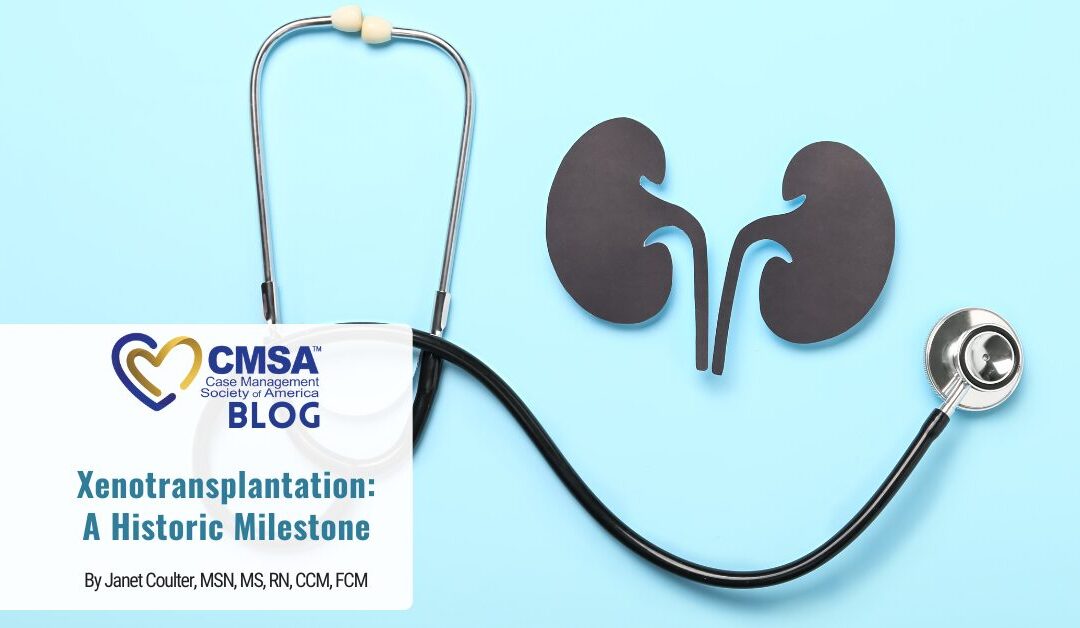By Janet Coulter, MSN, MS, RN, CCM, FCM
This past week at Massachusetts General Hospital, there was a historical milestone when a genetically modified pig kidney was successfully transplanted into a human recipient. This kind of transplantation, xenotransplantation, can open many doors for patients waiting for a kidney transplant. The transplanted pig kidney was engineered to decrease the chances of rejection by the recipient. The transplant physician, Dr. Leonardo Riella, has reported that the patient is doing exceptionally well, and bloodwork has been very positive. Dr. Riella reported that the development of CRISPR-Cas technology allowed for modifying multiple genes to make the pig kidney more compatible with humans. An area of concern is that the usual immune-suppressive medications given to patients post-transplantation are not as effective in xenotransplantation. The kidney transplant recipient is receiving a new medication, which is successful. The recipient is no longer on dialysis and is expected to be discharged home in a week. The recipient will be followed closely by the transplant team.
Did you know that one in three adults in the United States is at risk for kidney disease? That risk is increased for people of Black or African American, Hispanic or Latino, American Indian, Alaska Native, Asian American, Native Hawaiian, or Other Pacific Islander descent. Eight hundred fifty million people worldwide have some type of kidney disease. These conditions include acute kidney injury, kidney cysts, kidney stones, kidney infections, and kidney failure. It is incredible that two bean-shaped organs, the size of a fist, play a vital role in regulating health!
90,000 Americans are waiting for a kidney transplant. Some people do not get referred for a transplant. If they are referred and placed on the waiting list, they could be on the waiting list and receiving dialysis for several years while their health continues to deteriorate. There is always the possibility that, after waiting several years, they may not be a transplant candidate anymore. Disparity in kidney transplantation and organ shortages are issues. People may not be aware that they have a kidney issue because some kidney conditions are asymptomatic at first. Early detection is so important because, after just a few months, the damage to the kidneys may become irreparable. Early detection and treatment can slow the progression or even stop the progression.
How can kidney disease be prevented? A starting place is raising awareness about kidney disease and kidney health and educating the public. Embracing early diagnosis and treatment along with coordination of care is vital. Access to treatment and transplantation will eliminate disparities in the treatment of kidney disease. Preventive and prompt treatment includes choosing foods that are healthy, like fresh fruits and vegetables, whole grains, and low-fat or fat-free dairy products. Decreasing salt and sugar intake and baking or broiling meat is recommended. Reading food labels and avoiding canned and processed foods high in salt is a good start. Other recommendations include:
- increasing physical activity
- maintaining a healthy weight
- getting seven to eight hours of sleep every night
- stop smoking
- limit alcohol intake
- relax and manage stress level
- limited use of NSAIDs (can cause kidney damage)
The goal is to ensure that everyone has an equal chance for a healthy life with access to high-quality patient-centered kidney care from the time of diagnosis to transplantation. Increasing access for underserved populations is a start. Increasing the availability of organs and providing transplantation in a timely manner looks promising for the future!
How can you help? Become a donor! Provide education for your community and clients!
LIVE WEBINAR Thursday, April 11 at 12pm Eastern Register Now ![]() https://buff.ly/3VyLjHC “Create Your Eat Well Plan: Fast Tips to Eat to Reduce Inflammation & Feel Great” with Presenter Sue Levy, CEO and Founder, Savory Living - Pre-Approved CEs: 1 Hour RN and CCM
https://buff.ly/3VyLjHC “Create Your Eat Well Plan: Fast Tips to Eat to Reduce Inflammation & Feel Great” with Presenter Sue Levy, CEO and Founder, Savory Living - Pre-Approved CEs: 1 Hour RN and CCM
How we eat impacts our moods, our energy and how we feel. Ready to take control and activate healthy eating to reduce your signs of inflammation (belly fat, headaches, joint pain, digestive issues, high blood pressure, high cholesterol, diabetes, auto-immune conditions) AND improve how you feel? Join us to learn how to turn "I want to eat better" into new behaviors that stick! You'll identify your motivation, set your goals, and leave inspired with the breakfast, lunch and snack ideas you need to make it happen! Free to members. $40 for non-members.
Bio: Janet Coulter, MSN, MS, RN, CCM, FCM is a transplant case manager with a wide variety of experiences including educator, administrator, team leader, and Director of Case Management. Janet holds a Master of Science in Nursing from West Virginia University and a Master of Science in Adult Education from Marshall University. She has published many articles in CMSA Today and the Professional Case Management Journal and served as a reviewer for the Core Curriculum for Case Management Third Edition. She currently serves as President-Elect of CMSA,, Chair of the CMSA Today Editorial Board, Chair of the Nominations Committee, and Vice-President of the CMSA Foundation board. Janet was the recipient of the CMSA National Award of Service Excellence and Southern Ohio Valley CMSA Case Management Leadership award and was recently inducted as a Case Management Fellow from CMSA.


Wow that is so cool!